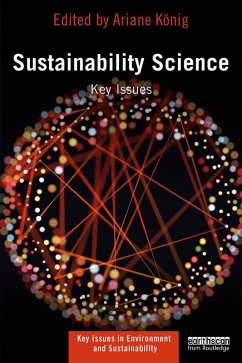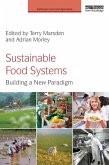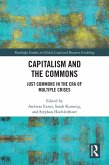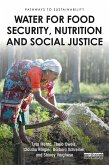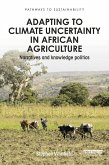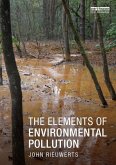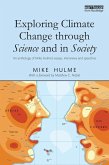Sustainability Science (eBook, PDF)
Key Issues
Redaktion: König, Ariane; Ravetz, Jerome
51,95 €
51,95 €
inkl. MwSt.
Sofort per Download lieferbar

26 °P sammeln
51,95 €
Als Download kaufen

51,95 €
inkl. MwSt.
Sofort per Download lieferbar

26 °P sammeln
Jetzt verschenken
Alle Infos zum eBook verschenken
51,95 €
inkl. MwSt.
Sofort per Download lieferbar
Alle Infos zum eBook verschenken

26 °P sammeln
Sustainability Science (eBook, PDF)
Key Issues
Redaktion: König, Ariane; Ravetz, Jerome
- Format: PDF
- Merkliste
- Auf die Merkliste
- Bewerten Bewerten
- Teilen
- Produkt teilen
- Produkterinnerung
- Produkterinnerung

Bitte loggen Sie sich zunächst in Ihr Kundenkonto ein oder registrieren Sie sich bei
bücher.de, um das eBook-Abo tolino select nutzen zu können.
Hier können Sie sich einloggen
Hier können Sie sich einloggen
Sie sind bereits eingeloggt. Klicken Sie auf 2. tolino select Abo, um fortzufahren.

Bitte loggen Sie sich zunächst in Ihr Kundenkonto ein oder registrieren Sie sich bei bücher.de, um das eBook-Abo tolino select nutzen zu können.
Sustainability Science: Key issues is a comprehensive textbook for undergraduates and postgraudates from any disciplinary background studying the theory and practice of sustainability science.
- Geräte: PC
- mit Kopierschutz
- eBook Hilfe
- Größe: 5.89MB
Andere Kunden interessierten sich auch für
![Sustainable Food Systems (eBook, PDF) Sustainable Food Systems (eBook, PDF)]() Sustainable Food Systems (eBook, PDF)51,95 €
Sustainable Food Systems (eBook, PDF)51,95 €![Capitalism and the Commons (eBook, PDF) Capitalism and the Commons (eBook, PDF)]() Capitalism and the Commons (eBook, PDF)43,95 €
Capitalism and the Commons (eBook, PDF)43,95 €![An Introduction to Sustainable Aquaculture (eBook, PDF) An Introduction to Sustainable Aquaculture (eBook, PDF)]() An Introduction to Sustainable Aquaculture (eBook, PDF)39,95 €
An Introduction to Sustainable Aquaculture (eBook, PDF)39,95 €![Water for Food Security, Nutrition and Social Justice (eBook, PDF) Water for Food Security, Nutrition and Social Justice (eBook, PDF)]() Lyla MehtaWater for Food Security, Nutrition and Social Justice (eBook, PDF)35,95 €
Lyla MehtaWater for Food Security, Nutrition and Social Justice (eBook, PDF)35,95 €![Adapting to Climate Uncertainty in African Agriculture (eBook, PDF) Adapting to Climate Uncertainty in African Agriculture (eBook, PDF)]() Stephen WhitfieldAdapting to Climate Uncertainty in African Agriculture (eBook, PDF)31,95 €
Stephen WhitfieldAdapting to Climate Uncertainty in African Agriculture (eBook, PDF)31,95 €![The Elements of Environmental Pollution (eBook, PDF) The Elements of Environmental Pollution (eBook, PDF)]() John RieuwertsThe Elements of Environmental Pollution (eBook, PDF)78,95 €
John RieuwertsThe Elements of Environmental Pollution (eBook, PDF)78,95 €![Exploring Climate Change through Science and in Society (eBook, PDF) Exploring Climate Change through Science and in Society (eBook, PDF)]() Mike HulmeExploring Climate Change through Science and in Society (eBook, PDF)57,95 €
Mike HulmeExploring Climate Change through Science and in Society (eBook, PDF)57,95 €-
-
-
Sustainability Science: Key issues is a comprehensive textbook for undergraduates and postgraudates from any disciplinary background studying the theory and practice of sustainability science.
Dieser Download kann aus rechtlichen Gründen nur mit Rechnungsadresse in A, B, BG, CY, CZ, D, DK, EW, E, FIN, F, GR, HR, H, IRL, I, LT, L, LR, M, NL, PL, P, R, S, SLO, SK ausgeliefert werden.
Produktdetails
- Produktdetails
- Verlag: Taylor & Francis eBooks
- Seitenzahl: 396
- Erscheinungstermin: 22. November 2017
- Englisch
- ISBN-13: 9781317216636
- Artikelnr.: 50518288
- Verlag: Taylor & Francis eBooks
- Seitenzahl: 396
- Erscheinungstermin: 22. November 2017
- Englisch
- ISBN-13: 9781317216636
- Artikelnr.: 50518288
- Herstellerkennzeichnung Die Herstellerinformationen sind derzeit nicht verfügbar.
Ariane König is a Senior Researcher in the Research Unit for Education, Cognition, Culture and Society at the University of Luxembourg. Jerome Ravetz is an Associate Fellow at the Institute for Science, Innovation and Society, University of Oxford.
Introduction
Chapter 1. Sustainability science as a transformative social learning
process Ariane König
Chapter 2. Flowers of resistance: Citizen science, ecological democracy and
the transgressive education paradigm Arjen E.J. Wals, Michael A. Peters
Part I. Embracing complexity and alternative futures: Conceptual tools and
methods
Chapter 3. Systems approaches for transforming social practice: Design
requirements Ariane König
Chapter 4. Cognitive pitfalls in dealing with sustainability Philipp
Sonnleitner
Chapter 5. Escaping the complexity dilemma Barry Newell, Katrina Proust
Chapter 6. Exploring alternative futures with scenarios Gerard Drenth,
Shirin Elahi, Ariane König
Chapter 7. Social technology and Theory U: Co-creating actionable knowledge
for
leadership Isabel Page
Chapter 8. Staging design-thinking for sustainability in practice: Guidance
and watch-outs Kilian Gericke, Boris Eisenbart, Gregor Waltersdorfer
Part II. What might transformations look like? Sectoral challenges and
interdependence
Chapter 9. Can ecosystem services help agricultural transitions? Nicolas
Dendoncker, Emilie Crouzat
Chapter 10. Food systems and human ecology: An overview Federico Davila,
Robert Dyball
Chapter 11. Energy: Physical and technical basics Susanne Siebentritt
Chapter 12. Urban energy transitions from innovations in green building
Julia Affolderbach, Bérénice Jung-Preller, Christian Schulz
Chapter 13. Democratising renewable energy production: A Luxembourgish
perspective Kristina Hondrila, Simon Norcross, Paulina Golinska, Vladimir
Broz, Aydeli Rios, Jules Muller
Chapter 14. Community-based monitoring for improved water governance Kim
Chi Tran, Ariane König
Part III. Tracking, steering and judging transformation
Chapter 15. Sustainability indicators: Quality and quantity Jerome Ravetz,
Paula Hild, Olivier Thunus, Julien Bollati
Chapter 16. Complex learning Sebastian Manhart
Chapter 17. Uncertainty as a key to sustainability economics Jerome Ravetz
Chapter 18. Post-Script: Heuristics for sustainability science Jerome
Ravetz
Chapter 19. Outlook: The changing relationship between citizens and science
in the Anthropocene Ariane König
Chapter 1. Sustainability science as a transformative social learning
process Ariane König
Chapter 2. Flowers of resistance: Citizen science, ecological democracy and
the transgressive education paradigm Arjen E.J. Wals, Michael A. Peters
Part I. Embracing complexity and alternative futures: Conceptual tools and
methods
Chapter 3. Systems approaches for transforming social practice: Design
requirements Ariane König
Chapter 4. Cognitive pitfalls in dealing with sustainability Philipp
Sonnleitner
Chapter 5. Escaping the complexity dilemma Barry Newell, Katrina Proust
Chapter 6. Exploring alternative futures with scenarios Gerard Drenth,
Shirin Elahi, Ariane König
Chapter 7. Social technology and Theory U: Co-creating actionable knowledge
for
leadership Isabel Page
Chapter 8. Staging design-thinking for sustainability in practice: Guidance
and watch-outs Kilian Gericke, Boris Eisenbart, Gregor Waltersdorfer
Part II. What might transformations look like? Sectoral challenges and
interdependence
Chapter 9. Can ecosystem services help agricultural transitions? Nicolas
Dendoncker, Emilie Crouzat
Chapter 10. Food systems and human ecology: An overview Federico Davila,
Robert Dyball
Chapter 11. Energy: Physical and technical basics Susanne Siebentritt
Chapter 12. Urban energy transitions from innovations in green building
Julia Affolderbach, Bérénice Jung-Preller, Christian Schulz
Chapter 13. Democratising renewable energy production: A Luxembourgish
perspective Kristina Hondrila, Simon Norcross, Paulina Golinska, Vladimir
Broz, Aydeli Rios, Jules Muller
Chapter 14. Community-based monitoring for improved water governance Kim
Chi Tran, Ariane König
Part III. Tracking, steering and judging transformation
Chapter 15. Sustainability indicators: Quality and quantity Jerome Ravetz,
Paula Hild, Olivier Thunus, Julien Bollati
Chapter 16. Complex learning Sebastian Manhart
Chapter 17. Uncertainty as a key to sustainability economics Jerome Ravetz
Chapter 18. Post-Script: Heuristics for sustainability science Jerome
Ravetz
Chapter 19. Outlook: The changing relationship between citizens and science
in the Anthropocene Ariane König
Introduction
Chapter 1. Sustainability science as a transformative social learning
process Ariane König
Chapter 2. Flowers of resistance: Citizen science, ecological democracy and
the transgressive education paradigm Arjen E.J. Wals, Michael A. Peters
Part I. Embracing complexity and alternative futures: Conceptual tools and
methods
Chapter 3. Systems approaches for transforming social practice: Design
requirements Ariane König
Chapter 4. Cognitive pitfalls in dealing with sustainability Philipp
Sonnleitner
Chapter 5. Escaping the complexity dilemma Barry Newell, Katrina Proust
Chapter 6. Exploring alternative futures with scenarios Gerard Drenth,
Shirin Elahi, Ariane König
Chapter 7. Social technology and Theory U: Co-creating actionable knowledge
for
leadership Isabel Page
Chapter 8. Staging design-thinking for sustainability in practice: Guidance
and watch-outs Kilian Gericke, Boris Eisenbart, Gregor Waltersdorfer
Part II. What might transformations look like? Sectoral challenges and
interdependence
Chapter 9. Can ecosystem services help agricultural transitions? Nicolas
Dendoncker, Emilie Crouzat
Chapter 10. Food systems and human ecology: An overview Federico Davila,
Robert Dyball
Chapter 11. Energy: Physical and technical basics Susanne Siebentritt
Chapter 12. Urban energy transitions from innovations in green building
Julia Affolderbach, Bérénice Jung-Preller, Christian Schulz
Chapter 13. Democratising renewable energy production: A Luxembourgish
perspective Kristina Hondrila, Simon Norcross, Paulina Golinska, Vladimir
Broz, Aydeli Rios, Jules Muller
Chapter 14. Community-based monitoring for improved water governance Kim
Chi Tran, Ariane König
Part III. Tracking, steering and judging transformation
Chapter 15. Sustainability indicators: Quality and quantity Jerome Ravetz,
Paula Hild, Olivier Thunus, Julien Bollati
Chapter 16. Complex learning Sebastian Manhart
Chapter 17. Uncertainty as a key to sustainability economics Jerome Ravetz
Chapter 18. Post-Script: Heuristics for sustainability science Jerome
Ravetz
Chapter 19. Outlook: The changing relationship between citizens and science
in the Anthropocene Ariane König
Chapter 1. Sustainability science as a transformative social learning
process Ariane König
Chapter 2. Flowers of resistance: Citizen science, ecological democracy and
the transgressive education paradigm Arjen E.J. Wals, Michael A. Peters
Part I. Embracing complexity and alternative futures: Conceptual tools and
methods
Chapter 3. Systems approaches for transforming social practice: Design
requirements Ariane König
Chapter 4. Cognitive pitfalls in dealing with sustainability Philipp
Sonnleitner
Chapter 5. Escaping the complexity dilemma Barry Newell, Katrina Proust
Chapter 6. Exploring alternative futures with scenarios Gerard Drenth,
Shirin Elahi, Ariane König
Chapter 7. Social technology and Theory U: Co-creating actionable knowledge
for
leadership Isabel Page
Chapter 8. Staging design-thinking for sustainability in practice: Guidance
and watch-outs Kilian Gericke, Boris Eisenbart, Gregor Waltersdorfer
Part II. What might transformations look like? Sectoral challenges and
interdependence
Chapter 9. Can ecosystem services help agricultural transitions? Nicolas
Dendoncker, Emilie Crouzat
Chapter 10. Food systems and human ecology: An overview Federico Davila,
Robert Dyball
Chapter 11. Energy: Physical and technical basics Susanne Siebentritt
Chapter 12. Urban energy transitions from innovations in green building
Julia Affolderbach, Bérénice Jung-Preller, Christian Schulz
Chapter 13. Democratising renewable energy production: A Luxembourgish
perspective Kristina Hondrila, Simon Norcross, Paulina Golinska, Vladimir
Broz, Aydeli Rios, Jules Muller
Chapter 14. Community-based monitoring for improved water governance Kim
Chi Tran, Ariane König
Part III. Tracking, steering and judging transformation
Chapter 15. Sustainability indicators: Quality and quantity Jerome Ravetz,
Paula Hild, Olivier Thunus, Julien Bollati
Chapter 16. Complex learning Sebastian Manhart
Chapter 17. Uncertainty as a key to sustainability economics Jerome Ravetz
Chapter 18. Post-Script: Heuristics for sustainability science Jerome
Ravetz
Chapter 19. Outlook: The changing relationship between citizens and science
in the Anthropocene Ariane König
